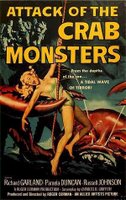
Crab monsters are hardly any problem these days.
Few buxom blondes are born away by enormous arthropods. What we have to contend with are crab's least likeable relatives, the ticks.
Crabs serve some ecological purpose. They consume detritus and other bits and pieces of stuff that other benthic organisms reject.
They're also a food source for octopuses and squids. And who knows, probably bigger crabs, too.
If crabs suddenly vanished from the seas, there would be consequences. Something unpredictably bad.
Consider the same exercise with ticks. No animals that we know of subsist on ticks.
Anteaters eat ants, which don't even taste good. Almost all organisms are consumed by other organisms. Mosquitoes provide food for birds, bats, reptiles and spiders. But ticks?
A creature that did eat ticks would have a difficult time finding them. They aren't a social insect, like ants. They're solitary and difficult to locate. And once captured, there isn't much to a tick unless it's engorged with blood.
Nature, in its wisdom, has eliminated the middle-man. Animals that live on blood take it directly from the source (leeches, bedbugs, mosquitoes, vampire bats, horseflies, and so on).
So, if ticks were no more, nothing would go hungry. Ticks don't even have fleas. Ticks, at their most benign, take blood and make more ticks. At their worst, they spread a variety of bacteria and protozoas.
This summer ticks are as thick as flies. They'll be with us until the daily high is 175 degrees and an absence of ozone bathes Earth in lethal ultraviolet rays. Even then, they will probably survive.
One need not believe in intelligent design to consider that ticks must be here for an important reason.
Once that becomes clear, it might shed light on the purpose of fleas.


No comments:
Post a Comment